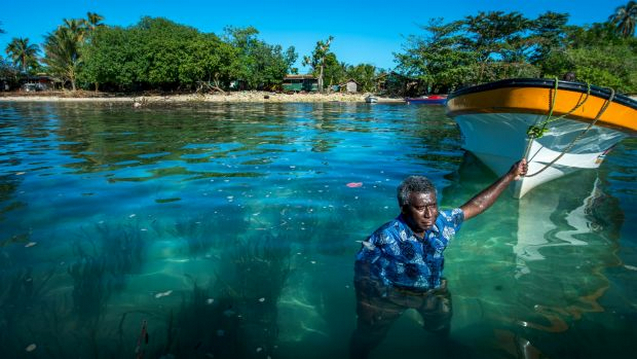A group of global institutions, including the World Bank, has told the Turnbull government that containing the effects of climate change must be a central pillar of Australia's new foreign policy.
The group, including the Asian Development Bank, Pacific Islands Forum and Australian Chamber of Commerce and Industry, says mitigation and adaptation will be needed to address the economic and security impacts of widespread environmental upheaval.
Billion dollar reef risk
The impact of climate change and Tropical Cyclone Debbie
could cost the Queensland tourism industry $1 billion according to a new
report form the Climate Council. Courtesy ABC, the Climate Council.
In the newly published submissions to the white paper process, the World Bank said 300 million people in the Asia-Pacific region were in danger of falling into extreme poverty as a result of climate change, natural disasters, disease and economic shocks.
The powerful financial institution asserted that 13 of the 30 countries most vulnerable to the impacts of global warming were in Australia's neighbourhood.
"Environmental sustainability – particularly efforts aimed to mitigate climate change and its effects on water scarcity, natural disasters, and small island states – is also important to Australia's security and wellbeing," it argued.
The Asian Development Bank described climate change as a "growing threat to prosperity and stability in the region". The 67-member development funding body said Asia, with booming and vulnerable populations, faced an $8 trillion infrastructure funding gap, and urged funding for climate change curbs and preparation.
"Huge investments in renewable energy, energy efficiency, sustainable transport and smart cities are needed," its submission said. "Countries must also invest in adaption through resilient infrastructure, smart agriculture, and better disaster preparedness."
 |
| Julie Bishop is looking to establish a new "philosophical framework" to guide Australia's foreign policy. Photo: Bloomberg |
Destruction of communities in the low-lying countries of the Asia-Pacific region could unleash a flood of displaced people, destabilising the region. According to projections, a one-metre sea level rise could swallow 20 per cent of Bangladesh and displace 30 million citizens. The Maldives has speculated about buying Australian land to accommodate the country's population in future.
 |
| Jackson Kiloe, the Premier of Taro in the Solomon Islands, standing where the shoreline used to be. Photo: Penny Stephens |
"A possible solution to address future migration challenges from climate change would be to build the capacity of populations who are likely to seek refuge in Australia."
Hundreds of submissions to the foreign policy white paper cover a vast array of policies, from navigating the relationships with China and the United States to maintaining free trade and boosting foreign aid spending.
In calling for government policy to protect vulnerable people and the environment, non-government organisations including World Vision, Save the Children, wildlife preservation group WWF and the Australian Council for International Development all touch on climate change as a threat relevant to their work.
The Australian Chamber of Commerce and Industry said global warming presented a growing risk to Australia's interests, including business.
"Viewed on its own, reducing emissions in Australia will have little impact on global atmospheric [greenhouse gas] concentrations," it wrote. "This is why Australia needs to support economic growth and assist regional partners to develop in a way that limits adverse environment impacts."
The Pacific Islands Forum, a group of 17 states, describe natural disasters and climate change as "major obstacles to future development" and a danger exacerbated by booming populations.
Climate change – which scientific consensus has found to be driven by human-generated greenhouse gas emissions –gradually lifts air and ocean temperatures, making weather patterns more unpredictable, intensifying natural disasters, raising sea levels and undermining critical environmental processes.
United States Secretary of Defence James Mattis recently told Congress that climate change was a driver of instability that had to be considered by the military.
Australia's 2016 Defence white paper labelled it a "major challenge for countries in Australia's immediate region".
Links

No comments :
Post a Comment